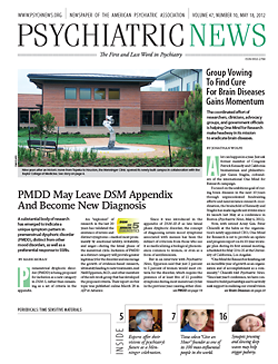How much would you pay to avoid or prevent a mental illness?
This is the question at the center of a new study comparing public perception of the burden associated with a range of medical conditions.
Featured in the April Psychiatric Services, the study found that while depression and schizophrenia are considered as burdensome as or more burdensome than diabetes, below-the-knee amputation, and partial blindness, individuals would be less willing to pay for a hypothetical pill that would prevent the onset of a mental illness than they would for other general medical illnesses.
For the study, Dylan Smith, Ph.D., of Stony Brook University’s Department of Preventive Medicine led a team of researchers from Duke University, the University of Michigan Medical School, and the U.S. Department of Veterans Affairs in assessing the results of a 2006 online survey of a random, representative sample of 710 U.S. adults.
In an effort to determine whether willingness to pay for the avoidance or prevention of a given illness is tied to the perceived quality-of-life burden associated with that illness, the researchers first had survey participants respond to the following scenario:
“Suppose a pill existed that would allow you to permanently and completely avoid ever having [health condition]. However, without the pill, you would have [health condition] … within a month. This pill is not covered by insurance, and you will have to pay out of pocket using your own financial assets and income. Please estimate the maximum dollar amount you think you would be willing and able to pay monthly for this treatment.”
Respondents were then asked to rate how burdensome they thought each illness would be on a scale of 0 to 100.
Depression was rated as having a mean burden score of 51.05, compared with 37.15 for diabetes, 41.26 for below-the-knee amputation, and 52.75 for partial blindness. However, respondents said they would be willing to pay only a median amount of $76.90 per month to avoid or prevent depression, compared with $92.97 for diabetes, $98.86 for amputation, and $109.13 for blindness.
And while survey participants expressed a willingness to pay a median $100.91 per month to avoid or prevent schizophrenia, an amount slightly higher than that for diabetes or amputation, the burden associated with schizophrenia was deemed to be the greatest, with a mean rating of 63.26.
The researchers reported similar findings from a separate series of analyses in which they excluded 260 respondents who reported ever having experienced any of the five illnesses identified in the survey. Eighty percent of those excluded from these additional evaluations said they had experienced depression.
The researchers suggested that the current dearth of federal funding for mental health research may be associated with the disparity between public perception of burden and the value of avoiding or preventing a mental illness as indicated by the survey results.
“Those who feel that the public is shortchanging mental illness will need to do more than convince the public that mental illnesses cause great burden or that people who bear that burden are worthy of help,” the researchers concluded.
The study was supported by a grant from the National Institute of Child Health and Development.


